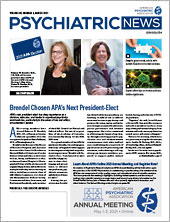Psychiatric interest in psychedelic compounds continues to swell with each new piece of clinical evidence showing their therapeutic potential. In November 2020, a randomized study published in JAMA revealed that psilocybin paired with psychotherapy led to rapid and sustained depression improvement in many patients. Even as psychedelic compounds inch closer to clinical use, questions on how to standardize psychedelic-assisted therapy and concerns over the use of these substances in uncontrolled settings loom large.
At APA’s 2021 online Annual Meeting, a trio of leaders in psychedelic research will discuss the history and future of psychedelics in psychiatry, focusing on the two agents designated as breakthrough therapies by the Food and Drug Administration: psilocybin and 3,4-methylenedioxymethamphetamine (MDMA).
The session will be chaired by William McDonald, M.D., the J. B. Fuqua Chair for Late-Life Depression at Emory University, and Collin Reiff, M.D., a clinical assistant professor of psychiatry at New York University (NYU) Grossman School of Medicine. McDonald and Reiff were part of the APA Council of Research work group that recently put together a comprehensive review of psychedelics and psychedelic-assisted psychotherapy that was published in the American Journal of Psychiatry.
“APA has featured sessions on psychedelics at past Annual Meetings, but this is the first time that the organization invited presentations on this topic,” McDonald said. “This shows how far psychedelic science has come and that psychiatrists should pay closer attention to this field.”
The symposium presenters include Stephen Ross, M.D., the founder and director of NYU’s Psychedelic Research Group; Michael Mithoefer, M.D., the senior medical director for the Multidisciplinary Association for Psychedelic Studies (MAPS); and Charles Raison, M.D., director of clinical and translational research for the nonprofit Usona Institute.
Ross spearheaded the modern resurgence in psilocybin research with his studies showing the drug’s ability to improve emotional well-being in late-stage cancer patients. He will open the symposium with a broad overview of psychedelics in mental health research, starting with the pioneering work of the University of Chicago’s Eric Kast, M.D., in the early 1960s. He will also provide an update on his group’s research with psilocybin-assisted psychotherapy in the treatment of depression and anxiety.
Mithoefer will follow with a presentation of data from ongoing trials examining the effectiveness of MDMA for posttraumatic stress disorder (PTSD) at MAPS. The organization is conducting two phase 3 trials involving MDMA for PTSD, the first of which was recently completed. If the findings of the trials replicate the positive and long-lasting improvements in PTSD symptoms in patients observed in smaller studies, then MDMA could be on its way to approval by the FDA.
Raison’s presentation will examine the potential ethical and safety issues that may arise when treating patients with psychedelics.
“In addition to addressing general questions about how to administer these substances and their potential side effects, this talk will tackle important clinical considerations,” Reiff said. “For example, given the effects of psychedelics on consciousness, what happens to patients who do not improve after taking these substances?”
The session will conclude with a 25-minute moderated discussion, during which attendees can ask questions of the presenters, Reiff and McDonald noted. “I think psychedelics are a discussion item that our members are ready and willing to have,” said Reiff. ■
“The Role of Psychedelics in Psychiatry” will be held Monday, May 3, from 4 p.m. to 5:30 p.m.

